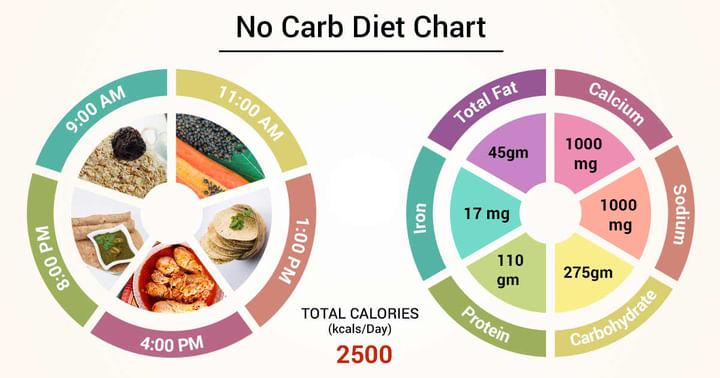Diet Chart For No carb
Last Updated: Jan 20, 2025
About
A no-carbohydrate diet (no-carb diet, zero carb diet) excludes dietary consumption of all carbohydrates (including dietary fiber) and suggests fat as the main source of energy with moderate amount of protein. A no-carbohydrate diet may be ketogenic, which means it causes the body to go into a state of ketosis, converting dietary fat and body fat into ketone bodies which are used as fuel to provide energy to the body, especially the brain. A no-carbohydrate diet may use mainly animal source foods and may include a high saturated fat intake. A no-carb diet is restricted in carbohydrates, like sugary foods, pasta, processed wheat products and bread. Instead, you eat the original form of the foods from which processed items are made, including protein, natural fats, vegetables and fruits.
Lower carb diets may be the best approach for improving body composition and biomarkers of health for obese, insulin resistant, and sedentary populations. I’ve consulted with a few corporate wellness programs that have used this strategy to collectively achieve thousands of pounds of weight loss, and even more importantly, dramatic improvements in biomarkers of health. The Caveman theme is simple to remember and relatively easy to apply, and thus it is a great educational tool for the complete beginner that doesn’t know (or care) much about nutrition. The improvement in food quality and nutrient density almost always improves diet numbers, leading to better blood sugar control, body composition, and biomarkers of health.
Diet Chart
| Sunday | |
| Breakfast (8:00-8:30AM) | Oats meal (1 cup) + Lemon juice (1/2 cup) |
| Mid-Meal (11:00-11:30AM) | Papaya (1 cup) |
| Lunch (2:00-2:30PM) | Yellow matar daal curry (1 cup) + Roasted papad (1) |
| Evening (4:00-4:30PM) | Chicken stew (1/2 cup) |
| Dinner (8:00-8:30PM) | Chapati (2-3) + Veg. curry (1/2 cup) |
| Monday | |
| Breakfast (8:00-8:30AM) | Milk n Cornflakes (1 cup) with Apple(1) |
| Mid-Meal (11:00-11:30AM) | 2 Ripe Banana |
| Lunch (2:00-2:30PM) | Rajma (1 cup) + Cucumber Raita (1/3 cup) |
| Evening (4:00-4:30PM) | Vegetable stew (1/2 cup) |
| Dinner (8:00-8:30PM) | Uttapam (2) |
| Tuesday | |
| Breakfast (8:00-8:30AM) | Milk n Banana shake (1 cup) + Toast (2 slices) |
| Mid-Meal (11:00-11:30AM) | Pineapple (1 cup) |
| Lunch (2:00-2:30PM) | Egg parantha (2) + Raita (1/2 cup) |
| Evening (4:00-4:30PM) | Corn soup (1/2 cup) |
| Dinner (8:00-8:30PM) | Carrot halwa (1/3 cup) + Appam (1) |
| Wednesday | |
| Breakfast (8:00-8:30AM) | Oats meal (1 cup) + Lemon juice (1/2 cup) |
| Mid-Meal (11:00-11:30AM) | Grapes (1 cup) |
| Lunch (2:00-2:30PM) | Mix daal (1 cup) + Roasted papad (1) |
| Evening (4:00-4:30PM) | Thai mushroom soup (1/2 cup) |
| Dinner (8:00-8:30PM) | Chapati (2-3) + Veg. curry (1/2 cup) |
| Thursday | |
| Breakfast (8:00-8:30AM) | Milk n Cornflakes (1 cup) with Strawberry |
| Mid-Meal (11:00-11:30AM) | Pomegranate (1 cup) |
| Lunch (2:00-2:30PM) | Masala dosa (1) + Samber (1/2 cup) |
| Evening (4:00-4:30PM) | Tomato soup (1/2 cup) |
| Dinner (8:00-8:30PM) | Uttapam (2) |
| Friday | |
| Breakfast (8:00-8:30AM) | Boiled Vegetable Salad (1 cup) + Milk (1/2 cup) |
| Mid-Meal (11:00-11:30AM) | 2 Oranges |
| Lunch (2:00-2:30PM) | Chana daal (1 cup) + Salad (1/2 cup) |
| Evening (4:00-4:30PM) | Carrot soup (1/2 cup) |
| Dinner (8:00-8:30PM) | Carrot halwa (1/3 cup) + Appam (1) |
| Saturday | |
| Breakfast (8:00-8:30AM) | Milk n Banana shake (1 cup) + Toast (2 slices) |
| Mid-Meal (11:00-11:30AM) | 1 Apple |
| Lunch (2:00-2:30PM) | Paneer parantha (2) + Cucumber raita (1/2 cup) |
| Evening (4:00-4:30PM) | Beetroot soup (1/2 cup) |
| Dinner (8:00-8:30PM) | Veg./ Chicken Thukpa (1/2 cup) |
Do's And Dont's
Do's:
- Try to have three meals and two snacks in a day.
- In the beggining, limit yourself to 20 grams of net carbs in a day, in which 12 to 15 grams should be from non-starchy vegetables.
- Drink plenty of water each day -- this includes coffee and/or tea, chicken soup and/or broth, etc.
Don'ts:
- Do not consume heavy carbohydrate foods like breads, pasta, macaroni, etc.
- Consumptin of alcohol and alcoholic beverages should be avoided.
- Never go more than 3-4 waking hours without having food.
Food Items You Can Easily Consume
- Meat- Beef, lamb, pork, chicken
- Fish: Salmon, trout, haddock
- Eggs: Omega-3 enriched or pastured eggs are best.
- Vegetables: Spinach, broccoli, cauliflower, carrots, mushrooms, peppers (capsicums), kale, spinach, green beans, Indian spinach, leeks and/or onions, tomatoes, brussel sprouts, avocado, cabbage, etc.
- Fruits: Apples, oranges, pears, blueberries, strawberries.
- Nuts and Seeds: Almonds, walnuts, sunflower seeds, etc.
- High-Fat Dairy: Cheese, butter, heavy cream, yogurt.
- Fats and Oils: Coconut oil, butter, lard, olive oil and cod fish liver oil, flax seed oil, ustard oil, ghee etc.
- Wine: Choose dry wines with no added sugar or carbs.
References
- Hursh H, Martin J. Low-carb and beyond: the health benefits of inulin. Cereal foods world. 2005 Mar 1;50(2):57.
- Chandler MJ, Hildebrandt LA. Should patients with diabetes follow a low-carb diet?. Journal of the American Academy of PAs. 2007 Oct 1;20(10):36-42.
- Oh R, Uppaluri KR. Low carbohydrate diet. InStatPearls [Internet] 2020 Jan 3. StatPearls Publishing.
Table of content
Find Dietitian/Nutritionist near me
Ask a free question
Get FREE multiple opinions from Doctors



